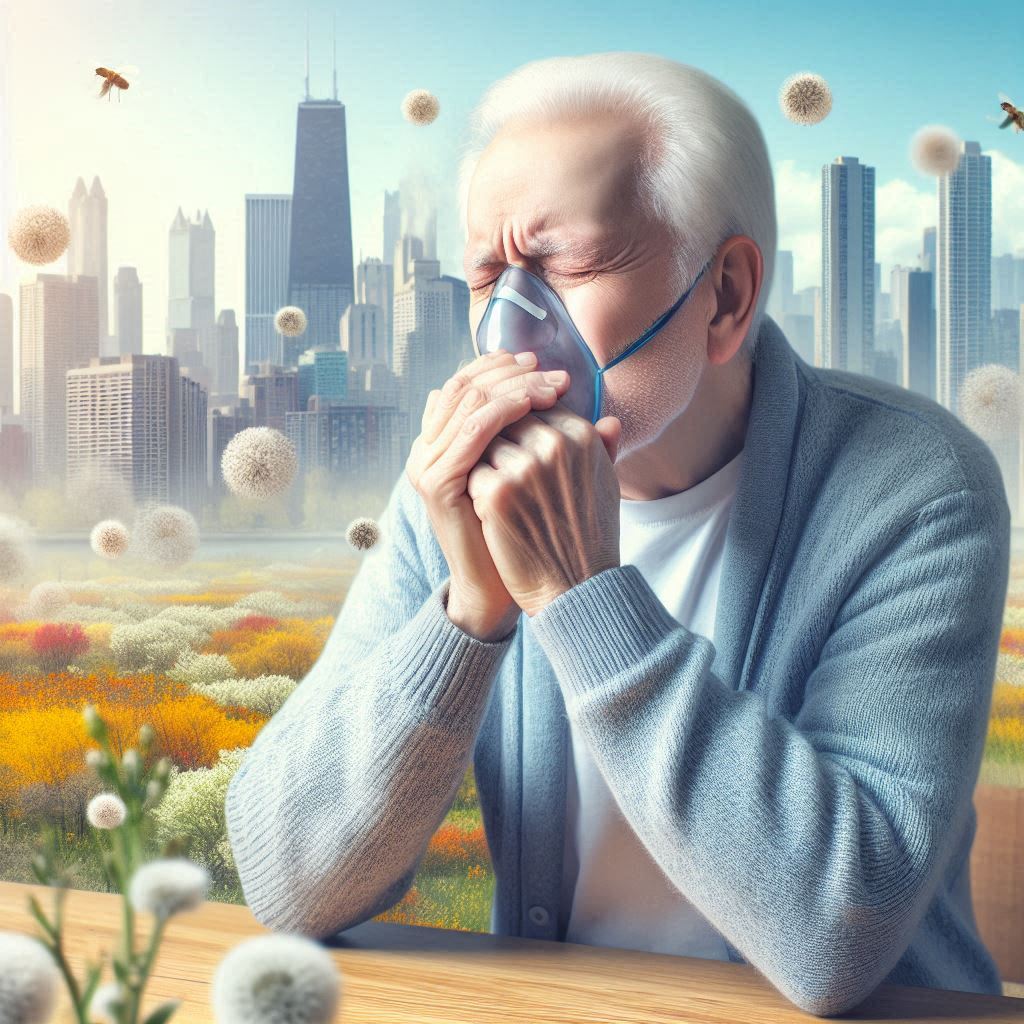Introduction
As Chicago’s long winter fades and spring blooms arrive, many seniors face increased allergy symptoms and respiratory challenges. The Midwest’s high pollen counts combined with urban pollution can create a perfect storm for coughing, wheezing, and breathing difficulties – especially for older adults with existing conditions like COPD or asthma.
At Healing Hands Home Care, Inc., we understand how seasonal allergies can impact senior health and independence. Our Chicago-based team specializes in helping seniors manage respiratory conditions while maintaining comfort at home. This guide offers practical, senior-friendly strategies to reduce allergy triggers, improve indoor air quality, and breathe easier throughout Chicago’s allergy season.
From understanding local pollen patterns to creating an allergy-proof home environment, we’ll share actionable tips to help your loved one enjoy spring while protecting their respiratory health.
Key Takeaways
- Chicago’s Allergy Hotspot: High tree pollen counts in spring affect many seniors
- Indoor Air Matters: Simple changes can reduce allergens at home
- Medication Management: Proper timing of allergy/asthma meds is crucial
- Early Warning Signs: Know when breathing trouble requires medical attention
- Local Resources: Chicago-specific pollen tracking and air quality alerts
- Home Care Support: We help seniors manage respiratory conditions safely
Main Content Sections
Understanding Chicago’s Spring Allergy Season
Chicago’s unique climate creates distinct allergy challenges for seniors:
Local Allergy Triggers:
- Tree pollen (especially oak, maple, and birch) peaks April-May
- Mold spores increase with spring rains
- Urban pollution mixes with pollen, worsening effects
Why Seniors Are More Vulnerable:
- Weakened immune systems react more strongly
- Existing respiratory conditions are easily aggravated
- Medication side effects may dry nasal passages
- Reduced mobility leads to more indoor allergen exposure
Chicago-Specific Data:
- Ranked among top 25 worst cities for spring allergies (AAFA)
- Pollen counts typically exceed “high” threshold 45+ days each spring
Creating an Allergy-Friendly Home
Air Quality Improvements:
- Use HEPA air purifiers in bedrooms
- Change HVAC filters monthly (MERV 11-13 rating)
- Maintain 40-50% humidity to discourage mold
- Schedule professional duct cleaning every 3-5 years
Daily Cleaning Strategies:
- Vacuum with HEPA filter 2-3 times weekly
- Wash bedding in hot water (130°F+) weekly
- Use microfiber cloths for dusting
- Remove shoes at the door to limit pollen
Smart Home Modifications:
- Install easy-clean window treatments
- Replace carpet with hard flooring where possible
- Create a “clean zone” bedroom with allergen barriers
Managing Medications & Treatments
Common Senior Allergy Medications:
- Antihistamines (watch for drowsiness side effects)
- Nasal corticosteroids (proper technique is key)
- Bronchodilators for COPD/asthma patients
Medication Safety Tips:
- Set up pill organizers with AM/PM doses
- Use spacers with inhalers for better delivery
- Track refills to prevent gaps in treatment
- Review all medications with doctor for interactions
When to Seek Help:
- Shortness of breath during normal activities
- Increased rescue inhaler use
- Thick yellow/green nasal discharge
- Fever with respiratory symptoms
Safe Outdoor Strategies for Chicago Seniors
Timing Matters:
- Plan outings for late afternoon when pollen counts drop
- Avoid windy days when allergens spread
- Check daily pollen forecasts at [Chicago Botanic Garden]
Protective Measures:
- Wear sunglasses and wide-brimmed hats
- Use N95 masks for yard work
- Rinse off after being outdoors
- Keep car windows up and use recirculated AC
Alternative Activities:
- Indoor senior exercise programs
- Museum days when counts are high
- Virtual garden tours during peak pollen
How Healing Hands Home Care Supports Respiratory Health
Our Chicago-Area Services Include:
- Medication reminder systems
- Home environment assessments
- Transportation to pulmonary appointments
- Emergency response planning
Specialized Care For:
- COPD management
- Post-hospitalization breathing recovery
- Asthma action plan implementation
Local Partnerships:
- Northwestern Medicine pulmonologists
- Chicago Department of Public Health programs
- American Lung Association resources
FAQ Section
1. What are the worst trees for allergies in Chicago?
Oak, maple, birch, and ash trees produce the most problematic pollen in our area.
2. How can I check daily pollen counts?
Use the Chicago Botanic Garden’s pollen tracker or sign up for alerts from the National Allergy Bureau.
3. Are humidifiers good for senior allergies?
Yes, but must be kept clean and maintained at 40-50% humidity to prevent mold growth.
4. When should a senior go to the ER for breathing problems?
If experiencing blue lips/nails, severe wheezing, or inability to speak full sentences.
5. Does Medicare cover air purifiers for seniors?
Sometimes, if prescribed for a diagnosed respiratory condition – we can help check eligibility.
Call-to-Action
Don’t let spring allergies compromise your loved one’s breathing and independence. Healing Hands Home Care’s Chicago team specializes in respiratory health support for seniors. Call us at (773) 792-3333 for a free home air quality assessment and personalized care plan. From medication management to allergen-reducing home modifications, we help seniors breathe easier all season long. Serving all Chicago neighborhoods and suburbs, we’re your local partners in senior respiratory health. Visit our website to learn more about our allergy season support services today!

